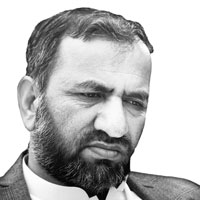ISLAMABAD — The snows are melting in Afghanistan, flowers (including opium poppies) will soon be blooming, and, in what has become an annual ritual, the Taliban have announced their plan for a spring offensive. They have given this one the name “Mullah Omar,” after the leader whose death they admitted only last year.
The Interior Ministry of he U.S.-backed government in Kabul responded by saying, “There is nothing new in the Taliban offensive.” But, in fact, this is not the same-old-same-old seasonal war. It is a test of the new leadership under Mullah Akhtar Muhammad Mansoor, whose authority has been contested by some factions. Leaders and fighters who have pledged allegiance to the self-declared caliphate of the so-called Islamic State (ISIS) in faraway Syria and Iraq also have eroded the Taliban ranks.
So, as one senior member of the Taliban explained, this year they will not only have to push into new territory, they will have to work to hold on to what they’ve recently taken.
“This year we are obliging almost 95 percent of the Taliban military commanders to be in their designated areas,” said the senior official. (That is, not in Pakistan or elsewhere.) “This will surely intensify Taliban operations.”
“In 2016 our prime targets will be sustained control of captured areas, suppression of internal Taliban rebellions and ISIS, and put pressure on major cities and provincial capitals,” the official told The Daily Beast. “In Helmand we control almost 90 percent of the ground,” he claimed, “while in Ghazni and Kunduz we are moving forward rapidly.”
Indeed, when the Taliban briefly took over the city of Kunduz last September, the Kabul government and the Americans lending air support initially operated in panic mode, destroying by mistake a trauma hospital run by Doctors Without Borders.
Another senior member of the Afghan Taliban military council says there will be a change in tactics this year. The Taliban (and they are not alone in this) believe that since the NATO and U.S. forces are drawing down, and less actively involved in the fight, that boosts Taliban confidence about concentrating forces for ground attacks.
The battle in Kunduz city and the takeover of the Helmand opium poppy region convinced the Taliban that the Afghan air force is not very effective and the Americans are reluctant to intervene.
“To avoid high casualties over the last five years we have not moved forward with concentrated forces,” said a senior member of the Afghan Taliban. “This year we will.”
Meanwhile, according to these Afghan Taliban sources, Mullah Mansoor decided after meeting with his aides to deploy rapid-reaction battalions able to move quickly to suppress the internal Taliban insurgency.
On the Kabul side of this picture, as peace talks seem to have little momentum and Pakistani government support for the Afghan Taliban continues to appear high—while American and NATO forces keep dwindling—morale is suffering.
As a 30-year-old Afghan Army major we’ll call Amir Shah put it when we talked recently in Kandahar, “We have enough courage to fight the Taliban and Pakistan, but we wish the system we are fighting for were less corrupt.”
“I don’t mind being killed fighting Pakistan’s proxies, the Taliban, but sometimes I ask myself: Does such a system so corrupt [as Kabul’s] deserve to be defended with such heavy casualties?”
Amir Shah says the toll on the Afghan Army troops is stunning. “Senior officers are throwing us in the middle of the Taliban without supply and reinforcement,” he says, while they are living the good life in Kabul.
Amir Shah says U.S. forces “used to support our mission effectively in the past, but they are not there anymore, and we have serious command and control gaps, and that’s why we are losing lots of soldiers in the countryside.”
Afghan army and security forces had particularly heavy casualties in Helmand province. So, Afghan President Ashraf Ghani appointed ex-communist Gen. Jabar Qahraman as his special representative for Helmand a few months back to improve the military situation.
An Afghan army soldier from Helmand province, Alizai, says things are a mess there. “We were under siege by the Taliban for weeks in Mosa Qala,” he told The Daily Beast. “We ate nothing but dry bread for 20 days. We were lucky to get out.”
I asked Alizai why he decided recently to leave the army, and his answer was understandable.
“Jabar Qahrman was a communist military officer who sat on top of a Russian tank and killed five members of my family in the 1980s,” he said, recalling the ferocious war against the Soviet-backed regime in what might have been figurative terms. “Now Ashraf Ghani wants to win this war with old communists, that is why I deserted my post.”
The Afghan president’s special envoy to Pakistan, Umar Zakhilwal, believes that at the moment we won’t see any breakthrough in peace talks. “My information and my report to the Afghan government is to prepare for the Taliban offensive,” he said.
So the fighting will begin, and intensify, and, yet, be incremental as each side hopes to gain ground before serious negotiations can begin for power sharing and a more lasting settlement.
I asked the senior Afghan Taliban leader if he thinks the Taliban will ever take the Afghan capital. “Our ultimate goal is not capturing Kabul,” he said, “but we could keep fighting forever.”






